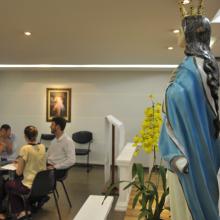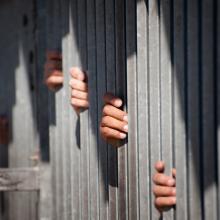ecumenical
UKRAINE IS, IN A WAY, a very pluralistic country. Nobody has an absolute majority. The Orthodox are the biggest group of believers, but they are divided into two jurisdictions — one that is independent and another one that depends, to a bigger or smaller degree, on Russia and the patriarchate of Moscow. Around 10 percent of the Ukrainian population are Catholic, mostly Eastern Catholic, and follow the same calendar and liturgy as the Orthodox. One to 2 percent are Latin Rite Catholics, and 1 to 2 percent are Protestant.
Meanwhile, the growth of the world-wide church surges in the global South. Gina Zurlo, Assistant Director of the Center for the Study of Global Christianity, explained today’s facts. Two-thirds of all Christians now live in the Global South. During the lifetime of most those gathered in Bogota, Christians in Africa have grown from 134 million in 1970 to 621 million today, making that continent home to more of world Christianity than any other region. Almost as many Christians are in the continent of Latin America where we met. Pentecostalism drives much of this growth. But the complexity, divisiveness, and conflicts between churches in these regions as well as globally clouds the picture projecting Christianity’s future.
On Monday, Oct. 31, in Sweden, Pope Francis will take part in an ecumenical service commemorating the beginning of the Protestant Reformation’s 500th year.
It is stunning to think the start of this momentous anniversary features a visit from the Roman pope.
And it raises a question: Does the Reformation still matter?

Image via Goias Courts of Justice / RNS
A pioneering mediation program in Brazil is banking on religious leaders using their conciliatory skills to resolve conflicts between families and neighbors, while helping the judicial system reduce a massive backlog of cases overloading the country’s courts. The “Mediar e Divino” (“To Mediate is Divine”) pilot project in the state of Goias, has started training evangelical pastors, Catholic priests, and Protestant ministers on the legalities of reconciling bickering parties and settling social squabbles.
“It’s a new form of Christianity,” explained Opoku Onyinah, “now also living in the West.” He’s the president of the Ghana Pentecostal and Charismatic Council, and also heads the Church of Pentecost, begun in Ghana and now in 84 nations. Onyinah was speaking at a workshop on “How Shall We Walk Between Cultures,” and explaining how African Christianity is interacting with postmodern culture. It was part of Empowered21, which gathered thousands of Pentecostals in Jerusalem over Pentecost.
I’ve found this idea intriguing. Pentecostalism, especially as it is emerging in the non-Western world, is a postmodern faith. Often I’ve said, “An evangelical wants to know what you believe, while a Pentecostal wants to hear your spiritual story.” Perhaps it’s an oversimplification. But Pentecostalism embodies a strong emphasis on narrative and finds reality in spiritual experiences that defy the logic and rationality of modern Western culture.
JERUSALEM — One out of four Christians today is Pentecostal or charismatic, which means one of every 12 persons living today practices a Pentecostal form of Christian faith. This, along with the astonishing growth of Christianity in Africa, are the two dominant narratives shaping world Christianity today. Further, the gulf between the older, historic churches, located largely in the global North, and the younger, emerging churches in the global South, often fueled by Pentecostal fire, constitutes the most serious division in the worldwide Body of Christ today.
One can also frame this as the divide between the global Pentecostal community, and the worldwide ecumenical movement. Each lives in virtual isolation from the other, and both suffer as a result. I call it ecclesiological apartheid, with its own endless, winding walls of separation. And these walls need to come down, for the sake of God’s love for the world.
It’s become my passion, in whatever small ways, to make some cracks in these walls.
IN NOVEMBER 1964, as the long Cold War heated up again, this time in Vietnam, Trappist monk Thomas Merton set forth a koan to 14 peacemakers: “By what right do Christians protest?” For three days, these activists and theologians—famously uniting Catholic and Protestant faith traditions—met with Merton in the Kentucky hills, grappling with how and why Christians should resist the violence of war.
Historian Gordon Oyer has re-created this meeting so pivotal to the peace movement and—most important—assessed its meaning for our time. The historic retreat is meticulously sourced with detailed textual analysis of the presenters at the retreat and the writers who influenced them. Particularly impressive is the lucid summary of the era and the delicacy and respect with which the author treats cultural and doctrinal differences among the participants.
Ecumenism in peace work is thankfully common today, but in the early ’60s the blending of faith traditions at the retreat was groundbreaking. Even more revolutionary were the two Masses the group celebrated together, with Jesuit priest Dan Berrigan presiding, everyone in the group receiving communion, and John Howard Yoder, a Mennonite theologian, preaching at the second liturgy. (Both practices were proscribed at the time.)
Attendees included Phil Berrigan, later one of the creators of the Plowshares actions for nuclear disarmament, and A.J. Muste, dean of the U.S. peace movement at the time, with years of experience in War Resisters League, the Committee for Nonviolent Action, and the Fellowship of Reconciliation (FOR). FOR’s Paul Peachey and John Heidbrink were instrumental in initiating and organizing the retreat, although neither of them could attend in the end. (Neither could two other invitees—Bayard Rustin and Martin Luther King Jr.)
I used to be in a fantasy league, but the fanaticism of the whole thing wore me out. The guys would gather online for an evening-long draft event, debate rules ad nauseam, and haggle over trades through the wee hours. I considered myself to be a fan, but these guys had practically made, well, a religion out of fantasy sports.
I was reading a piece today by Bruce Reyes Chow about what we Christians might learn from fantasy sports, and it got me thinking. One of the most interesting things being in the fantasy league did for me was that it totally changed how I watched the games. I would turn on games I never would have had interest in before, just to see how my selected running back performed. I even found myself rooting against my own favorite teams once in a blue moon when it served my fantasy team and didn’t affect the outcome of the actual game.
The whole experience drove my wife crazy, partly because of all the time it took, but also because the way I engaged sports was so different that, even if we were watching the same game, it was as if we saw two completely different things.
We’re in the middle of a similar kind of shift in the west with respect to organized religion. While folks within the walls of church may be intent primarily on keeping the institutions placed under their care alive, a growing majority of people outside the doors don’t really care about the denominational logo over the entryway, the name inscribed on the stone sign by the street or the long, rich history of all the congregation has meant to the community.
As an ecumenist I listened to (and largely bought) the notion that taking Communion with other Christians in the absence of institutional unity was tantamount to premarital sex, to an intimacy that should not be attempted because we were not — as disagreeing Christians — properly wed to each other yet.
But the more time I spend as a day-to-day trenches brand of pastor living out the faith in the real world, I find this argument holds less and less water.
A reality I have come to grips with after decades of personal ecumenical involvement is the same reality that leaders at the highest levels of churches have been wrestling with for centuries: The age-old pursuit of doctrinal unity under an authoritative “true church” will likely never occur before the Second Coming.
Another reality — a more personal one — has hit me with full force. This division at our Eucharists inflicts pain upon those of tender conscience and deep love for Christ and his bride. They are broken upon the rocks of our divisions and it is a scandal.
For years, advocates for greater unity among Christian churches have wrung their hands amid talk of an "ecumenical winter."
But now, 10 years after leaders took the first steps toward forming the broad-based group Christian Churches Together in the USA, some have hopes that U.S. churches may be entering a new season of closer relations.
At a recent CCT meeting in Memphis, Tenn., 85 Christians -- Catholic, Protestant and Orthodox, white and nonwhite -- made pilgrimages to historic sites of the civil rights movement. They also made plans to use next year's 50th anniversary of the Rev. Martin Luther King Jr.'s Letter from a Birmingham Jail to pursue anti-poverty projects with houses of worship unlike their own.
"I would like to think of it as an ecumenical spring and that we do not yet know what will break forth," said the Rev. Stephen J. Sidorak Jr., ecumenical staff officer of the United Methodist Church.
"I think that there's the potential for the ecumenical movement to be more alive than it's ever been because it will be more inclusive."
In many ways, the movement that has grappled with theological differences, leadership struggles, finances -- and even what to call itself -- is in the midst of major down-sizing that they hope will lead to wider engagement:
The compelling story of the Global Christian Forum, shared with the more than 300 forum attendees (many of them new), was told in moving testimonies from Orthodox, Pentecostal, Evangelical, Catholic, and historic Protestant members of the forum's steering committee. ... It's remarkable to hear how an Egyptian surgeon became a Coptic Orthodox priest, or how a woman Anglican Bishop from New Zeland heard her calling to the priesthood as a teenager, long before her church ordained women. Story after story simply puts you in awe of God's grace.
The Global Christian Forum is the most exciting and promising ecumenical initiative I've participated in all my years of ministry. Its import can be summed up simply: This is the only place where the leadership of evangelical, Pentecostal, Catholic, historic Protestant and Orthodox churches -- which comprise all the major "families" of world Christianity -- are brought into sustained and intentional fellowship. In so doing, the Global Christian Forum is also responding to the dramatic shift of the center of Christianity from the North and West to the southern hemisphere.









